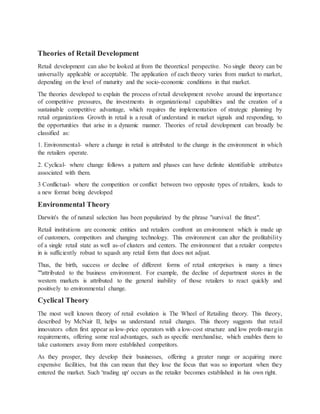
Theories of retail development
- 1. Theories of Retail Development Retail development can also be looked at from the theoretical perspective. No single theory can be universally applicable or acceptable. The application of each theory varies from market to market, depending on the level of maturity and the socio-economic conditions in that market. The theories developed to explain the process of retail development revolve around the importance of competitive pressures, the investments in organizational capabilities and the creation of a sustainable competitive advantage, which requires the implementation of strategic planning by retail organizations Growth in retail is a result of understand in market signals and responding, to the opportunities that arise in a dynamic manner. Theories of retail development can broadly be classified as: 1. Environmental- where a change in retail is attributed to the change in the environment in which the retailers operate. 2. Cyclical- where change follows a pattern and phases can have definite identifiable attributes associated with them. 3 Conflictual- where the competition or conflict between two opposite types of retailers, leads to a new format being developed Environmental Theory Darwin's the of natural selection has been popularized by the phrase "survival the fittest". Retail institutions are economic entities and retailers confront an environment which is made up of customers, competitors and changing technology. This environment can alter the profitability of a single retail state as well as-of clusters and centers. The environment that a retailer competes in is sufficiently robust to squash any retail form that does not adjust. Thus, the birth, success or decline of different forms of retail enterprises is many a times ""attributed to the business environment. For example, the decline of department stores in the western markets is attributed to the general inability of those retailers to react quickly and positively to environmental change. Cyclical Theory The most well known theory of retail evolution is The Wheel of Retailing theory. This theory, described by McNair II, helps us understand retail changes. This theory suggests that retail innovators often first appear as low-price operators with a low-cost structure and low profit-margin requirements, offering some real advantages, such as specific merchandise, which enables them to take customers away from more established competitors. As they prosper, they develop their businesses, offering a greater range or acquiring more expensive facilities, but this can mean that they lose the focus that was so important when they entered the market. Such 'trading up' occurs as the retailer becomes established in his own right.
- 2. Conflict Theory Conflict always exists between operators of similar formats or within broad retail categories. It is believed that retail innovation does not necessarily reduce the number of formats available to the consumer; instead, it leads to the development of more formats. Retailing thus evolves through a dialectic process, i.e., the blending of two opposites to create a new format.